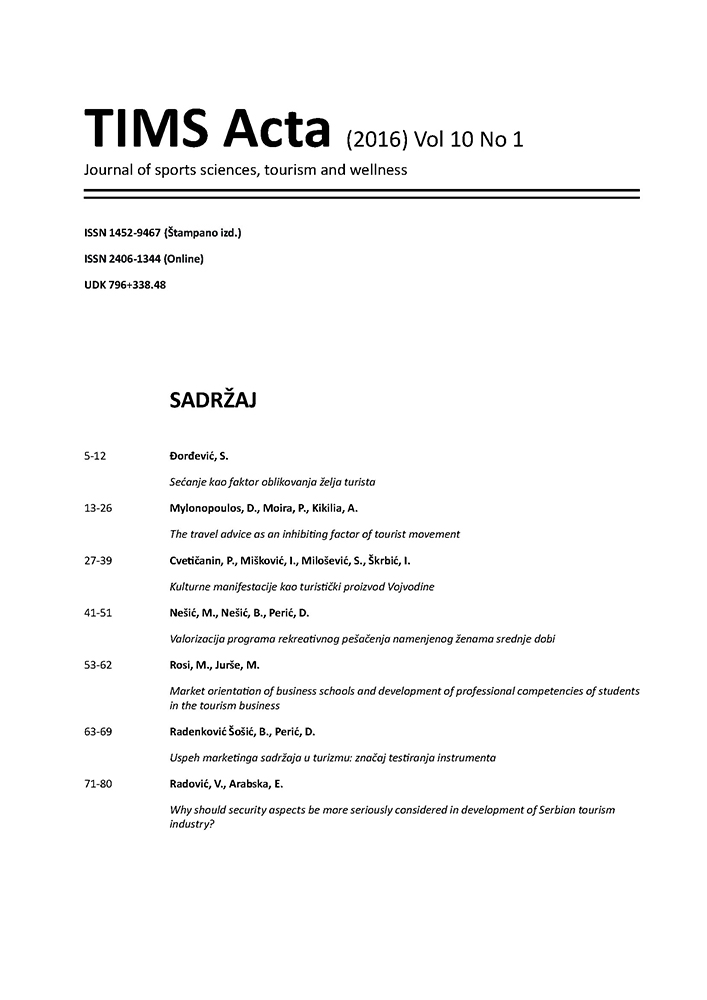MARKET ORIENTATION OF BUSINESS SCHOOLS AND STUDENT PROFESSIONAL COMPETENCIES DEVELOPMENT IN THE TOURISM BUSINESS
Sažetak
Recent trends of spreading trends of the market globalization, technological progress, internationalization, privatization and other relevant changes are strategically changing the context in which all institutions of the society operate and prosper. Also the higher education sector is affected, and, in particular, the business education has to be better aligned with these external realities. In this dynamic and changing environment, students, businesses and other stakeholders require knowledge and skills that will provide them with competency in relation to the current economic situation and technological advances. Tourism sector and whole economy increasingly depend on contemporary knowledge that provides appropriate job competency to students and competitive advantage to the providers of services Adjustment of public higher education institutions is important for enhancing their market position in increasingly competitive market for business education. There is an increasing number of private business schools that emerged recently, also in the field of tourism that have seen their great potential for business success and earnings in the increasingly competitive business education market, framed by a very dynamic and competitive environment of business education. In addition, business schools have to deal with the trend of shrinking budgetary (public) founding of their operation which forces them to search for additional funding by providing new educational offerings and strengthening of their market orientation. In the debate about the future of tourism education, there lies a gap between the requirements of the curriculum and the expectations of the industry, which argues that higher education has to serve the tourism of the future - that is to prepare students for a more active role in tourism organizations and in their search for improvements and adaptation to different competitive circumstances. Does business schools’ curriculum follow the development of key recent trends in the industry? The main objective of this paper is to identify the key aspects of the dynamic adaptation of university business schools and to elaborate on the possible linkage between the development of professional competences of students in the field of tourism and the professional requirements of organizations in this industry. We will use the comparative method (overview and comparison of tourist programs of selected faculties in selected countries of the former Yugoslavia, review and comparison of their programs regardless to any possible accreditation) and benchmarking analysis that will help us to identify differences in achieved professional student competencies in selected faculties and compare them against achieved professional student competencies of selected, leading faculties in central Europe in the field of tourism.
Key words: graduate professional competence, tourism education, market orientation of public higher education institutions, globalization, privatization of higher education
Reference
Bradshaw, D. (2011). Business school strategy: customer becomes king. Financial Training 2011. Financial times.
de Onzono, S. I., & Carmona, S. (2007). The changing business model of B-schools. Journal of Management Development, 26(1), 22-32.
EC - European Commission. Strong tourism season gives Europe an economic boost and much needed jobs. Brussels, 27 September 2013a. Available on: http://europa.eu/rapid/press-release_IP-13-878_en.htm [13.5.2014].
Inui, Y., Wheeler, D., & Lankford, S. (2006). Rethinking tourism education: What should schools teach. Journal of Hospitality, Leisure, Sport and Tourism Education, 5(2), 25-35.
Jameson-Charles, M. (2012). Tourism education from a relationship management perspective. Caribbean Curriculum Vol. 19, 2012, 145–170.
Millar, M., Mao, Z., & Moreo, P. (2010). Hospitality & tourism educators vs. the industry: A competency assessment. Journal of Hospitality & Tourism Education, 22(2), 38-50.
Morgan, J. (2004). From production line to drama school: Higher education for the further of tourism. International Journal of Contemporary Hospitality Management, 19, 91–99.
Nagarjuna G. & Kallarakal, T. K. (2014). Expectations of Tourism Industry on Competencies and Tourism Education. International Journal of Advanced Research (2014), Volume 2, Issue 1, 738-745.
Owusu-Mintah, S. B., & Kissi, M. (2012). INTERDISCIPLINARY JOURNAL OF CONTEMPORARY RESEARCH IN BUSINESS.
Peter. (2013). European cooperation in Vocational Education and Training (Europe 2020 strategy). Available on: http://epthinktank.eu/2013/10/02/european-cooperation-in-vocational-education-and-training-europe-2020-strategy/ [12.9.2015].
Tribe, J. (2001) Research Paradigms and the Tourism Curriculum. Journal of Travel Research, Vol. 39, 442-448.
Wattanacharoensil, W. (2013). Tourism Curriculum in a Global Perspective: Past, Present, and Future. International Education Studies, 7(1), p9.
- Autori zadržavaju autorska prava i pružaju časopisu pravo prvog objavljivanja rada i licenciraju ga "Creative Commons Attribution licencom" koja omogućava drugima da dele rad, uz uslov navođenja autorstva i izvornog objavljivanja u ovom časopisu.
- Autori mogu izraditi zasebne, ugovorne aranžmane za neekskluzivnu distribuciju članka objavljenog u časopisu (npr. postavljanje u institucionalni repozitorijum ili objavljivanje u knjizi), uz navođenje da je članak izvorno objavljen u ovom časopisu.
- Autorima je dozvoljeno i podstiču se da postave objavljeni članak onlajn (npr. u institucionalni repozitorijum ili na svoju internet stranicu) pre ili tokom postupka prijave rukopisa, s obzirom da takav postupak može voditi produktivnoj razmeni ideja i ranijoj i većoj citiranosti objavljenog članka (Vidi Efekti otvorenog pristupa).

